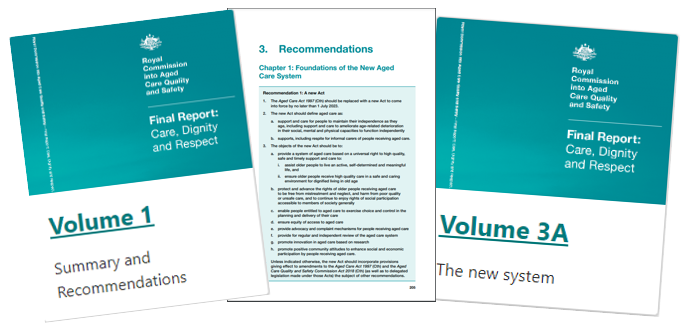Since the Royal Commission into Aged Care handed down its final recommendations in February 2021, the pace of change has continued to accelerate in response to the challenges and needs of the industry. As we are all aware these challenges were stretched tremendously during the COVID-19 pandemic particularly in Victoria.

It is encouraging to see the focus that Palliative Care received during the Royal Commission and in line with the vision of Palliative Care Australia, palliative care is now increasingly being seen as “core business” within aged care. Broadly, the recommendations specific to Palliative Care included:
- That there should be fair, equitable and non-discriminatory access to palliative and end-of- life care.
- That end-of-life care, alongside other specific clinical needs require individualised comprehensive and ongoing assessment and review to ensure high quality care.
- That the Aged Care Quality Standards require urgent review and should include provision for high quality palliative care in relation to staff capacity, governance and recognition and quality management of deteriorating and dying.
- That the Aged Care Quality standards should include mandatory requirements to make and update Advanced Care Plans with demonstration of implementation.
- Specific recommendations on access to dementia specialist services and the establishment of a dementia support pathway if successfully implemented should support palliative care and end-of-life for the increasing numbers of individuals living and dying with dementia.
The most transparent reform to date that has included a specific focus on end-of-life is the introduction of the new funding tool, the Australian National Aged Care Classification (AN-ACC). In recognition of palliation and end-of-life being a “core service” of residential aged care the AN-ACC, includes provision for new residents entering residential care with an expected life limiting condition (up to 3 months) to have verification and documentation supported by their General Practitioner or Nurse Practitioner. This reform will help to strengthen palliative care services in residential aged care.
Other reforms that are scheduled for 2023 include:
- Strengthening regional networks to understand and deliver local solutions that work for local communities by expanding regional networks to support local communities.
- Designing new home care programs through the provision of a new Home Support Program.
- Funding a range of projects to support “culturally safe care” including an expansion of aged care services for Aboriginal and Torres Strait people.
- Food and Nutrition standards to be introduced including strengthened reporting requirements.
- A new registration scheme for personal care workers.
The industry is changing rapidly and these ongoing reforms follow significant changes that continue to be embedded. In particular the Star Rating system for all homes – more on this to come!
You can read more about the Aged Care Reforms at:
Aged care reforms | Australian Government Department of Health and Aged Care
You can subscribe to the newsletter to receive updates on the reforms and may be asked to participate in some reviews:
Subscribe to our EngAged newsletter | Australian Government Department of Health and Aged Care
Author:
Jenny Cotterell, Aged Care Project Officer, Palliative Care Victoria